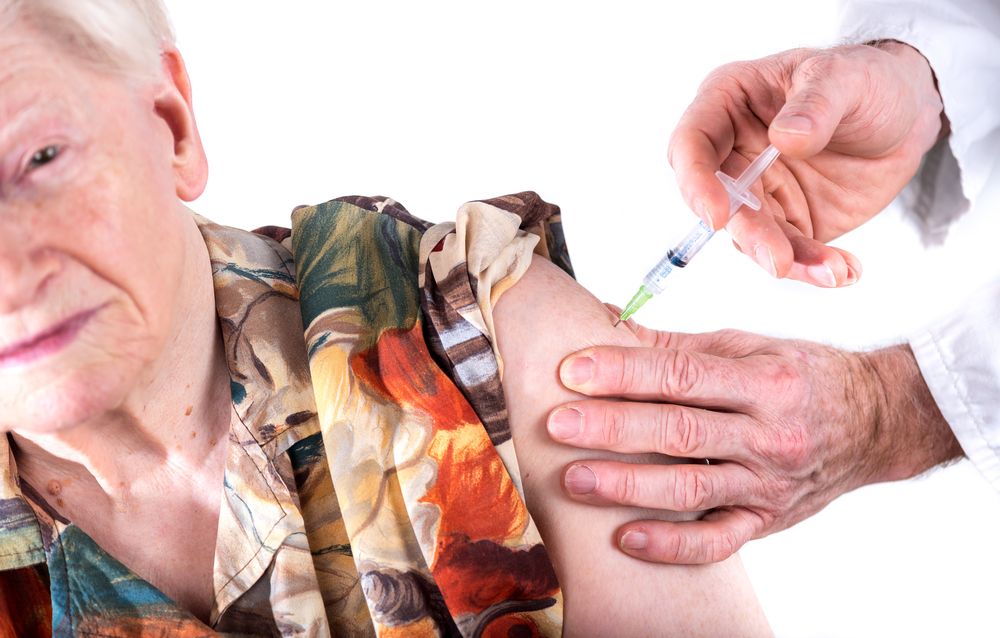High Dose Flu Shot Best for Rheumatoid Arthritis
In patients with seropositive rheumatoid arthritis, high-dose trivalent inactivated influenza vaccine (HD-TIV) is safe and more immunogenic than standard-dose quadrivalent influenza vaccine (SD-QIV), say researchers writing in The Lancet Rheumatology.
(©thodonal88,Shutterstock.com)

In patients with seropositive rheumatoid arthritis, high-dose trivalent inactivated influenza vaccine (HD-TIV) is safe and more immunogenic than standard-dose quadrivalent influenza vaccine (SD-QIV), say researchers writing in The Lancet Rheumatology.
Influenza viruses cause substantial morbidity and mortality worldwide. Patients with rheumatoid arthritis have increased risk of seasonal influenza and related complications but have reduced vaccine immunogenicity. In both older people and rheumatoid arthritis patients, reduced vaccine-induced protective responses have been attributed to chronic inflammation, an increased frequency of comorbidities, and polypharmacy. While two influenza vaccines developed for older people have shown greater immunogenicity compared with standard-dose vaccines in other immunocompromised individuals, no studies have compared these formulations to a standard-dose vaccine in patients with chronic rheumatic diseases.
“The primary objective of this study was to compare the immunogenicity of HD-TIV to SD-QIV in patients with seropositive rheumatoid arthritis. We also report on the safety of both vaccines in this population,” wrote the authors, led by Inés Colmegna, M.D., of McGill University in Montreal, Canada.
The study included 274 adults with rheumatoid arthritis who were taking disease-modifying antirheumatic drugs (DMARDs) and their treatment had not been modified during the past three months. Participants were stratified into one of three groups. Patients taking conventional or targeted synthetic DMARDs (methotrexate, hydroxychloroquine, and sulfasalazine) as monotherapy or in combination were stratified to group 1; those on a biological DMARD (anti-tumor necrosis factor or anti-interleukin 6), with or without methotrexate, hydroxychloroquine, or sulfasalazine were stratified to group 2; and patients who were taking abatacept, tofacitinib, or rituximab, with or without methotrexate, hydroxychloroquine, or sulfasalazine were stratified to group 3. Participants were randomly allocated to receive the SD-QIV or HD-TIV vaccine. The primary outcome was the seroconversion rate per strain at day 28.
Patients who received HD-TIV were more likely to seroconvert than those who received SD-QIV: the odds ratio was 2.99 (95% CI 1.46–6.11) for seroconversion to strain A/H3N2, 1.95 (1.19–3.22) to strain B/Bris, 3.21 (1.57–6.56) to strain A/H1N1 (in 2016–2017), and 2.44 (1.18–5.06) to strain A/H1N1 (in 2017–2018).
Similar results were seen in patients from groups 1 and 2, but the number of participants in group 3 was insufficient to draw conclusions. The use of methotrexate in conventional synthetic DMARD-only regimens or in combination with biologics did not reduce the seroconversion to the HD-TIV. Also, compared with conventional synthetic DMARDs, the use of biological DMARDs (excluding rituximab) was not associated with a reduction in the response to HD-TIV.
“The benefit of the HD-TIV in patients with seropositive rheumatoid arthritis is not restricted to those on a specific treatment,” the authors wrote.
Local and systemic adverse events were similar in both vaccine groups, no serious adverse events were reported, and neither vaccine increased rheumatoid arthritis disease activity.
“This is the first study to test the immunogenicity of the HD-TIV in patients with autoimmune or inflammatory arthritis with or without biologic therapy,” the authors wrote. “This study highlights a potential benefit of using HD-TIV in all rheumatoid arthritis patients.”
Multiple strategies are needed “to enhance protection for patients with rheumatoid arthritis, including the maintenance of high vaccination coverage among the family members and close contacts of patients,” the authors wrote.
REFERENCE
Inés Colmegna, Mariana L Useche, Katherine Rodriguez, et al. “Immunogenicity and safety of high-dose versus standard-dose inactivated influenza vaccine in rheumatoid arthritis patients: a randomised, double-blind, active-comparator trial.” The Lancet Rheumatology. November 20, 2019. DOI: https://doi.org/10.1016/S2665-9913(19)30094-3.